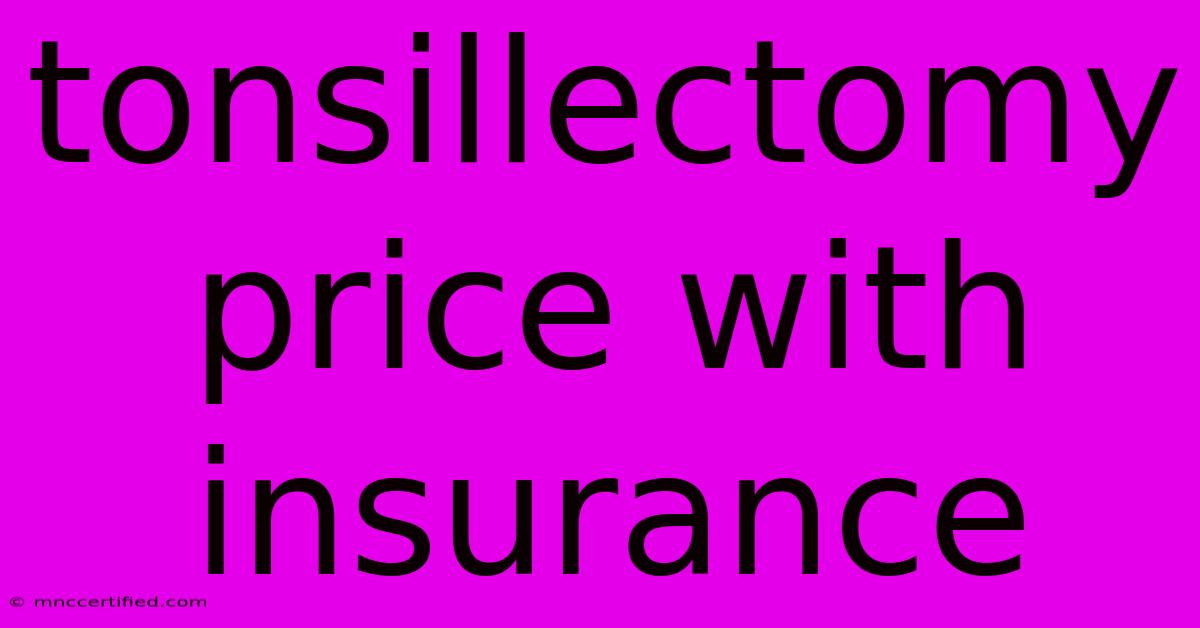Tonsillectomy Price With Insurance

Table of Contents
Tonsillectomy Price with Insurance: A Comprehensive Guide
Getting your tonsils removed is a significant decision, and understanding the financial implications is crucial. This guide explores the cost of a tonsillectomy with insurance, breaking down the factors influencing the final price and offering advice on navigating the process.
Understanding the Cost of a Tonsillectomy
The price of a tonsillectomy varies significantly depending on several factors. Before delving into insurance coverage, let's look at the base costs:
-
Hospital vs. Outpatient Surgery Center: Hospital procedures generally cost more due to higher overhead. Outpatient surgery centers often offer lower costs but may have fewer amenities.
-
Anesthesia: This is a major component of the total cost. The type of anesthesia (general vs. local) and the duration will influence the price.
-
Surgeon's Fees: Surgeons' fees can vary widely based on their experience, location, and reputation.
-
Post-Operative Care: This includes follow-up appointments, medication, and potential complications requiring further treatment. These costs can add up.
-
Length of Stay: For hospital stays, the number of days required significantly impacts the overall cost. Most tonsillectomies are now performed as outpatient procedures, minimizing this cost.
How Insurance Impacts Tonsillectomy Costs
Your insurance plan plays a pivotal role in determining your out-of-pocket expenses. Here's what you need to know:
Understanding Your Policy:
- Deductible: This is the amount you must pay out-of-pocket before your insurance coverage kicks in.
- Copay: A fixed amount you pay for covered services at the time of service.
- Coinsurance: The percentage of costs you share with your insurance company after meeting your deductible.
- Out-of-Network Providers: Using a surgeon or facility not in your insurance network will likely result in significantly higher out-of-pocket costs.
- Pre-authorization: Many insurance plans require pre-authorization for procedures like tonsillectomies. Failure to obtain this can lead to denied claims.
Pro-Tip: Carefully review your insurance policy's specific coverage for tonsillectomies, including exclusions and limitations. Contact your insurance provider directly to clarify any ambiguities.
Factors Affecting Insurance Coverage:
-
Medical Necessity: Insurance companies typically only cover tonsillectomies deemed medically necessary. This means providing sufficient documentation to justify the procedure. Repeated infections, sleep apnea, or other significant medical reasons are usually required.
-
Pre-existing Conditions: Pre-existing conditions may influence coverage. Discuss this with your doctor and insurance provider upfront.
-
Plan Type: The type of insurance plan (e.g., HMO, PPO, POS) directly affects coverage and out-of-pocket costs.
Estimating Your Out-of-Pocket Costs
Accurately predicting your final cost is difficult without knowing your specific insurance plan and the details of the procedure. However, you can take these steps:
-
Contact your insurance provider: Obtain a pre-authorization and get an estimate of your anticipated costs based on your policy.
-
Get quotes from multiple providers: Compare the fees of different surgeons and facilities within your insurance network.
-
Ask about payment plans: Many facilities offer payment plans to make the procedure more manageable.
Minimizing the Cost of Your Tonsillectomy
Here are some strategies to help minimize your expenses:
-
Choose an in-network provider: Selecting a surgeon and facility within your insurance network is essential for maximizing coverage.
-
Explore options for financial assistance: Some hospitals and clinics offer financial assistance programs for patients who qualify.
-
Negotiate payment terms: Don't hesitate to discuss payment options with the healthcare provider's billing department.
Conclusion
The price of a tonsillectomy with insurance varies greatly. Thorough planning and understanding your insurance coverage are crucial for managing the costs effectively. By following the tips outlined above, you can navigate the process with more confidence and minimize your financial burden. Remember to communicate openly with your doctor, insurance provider, and the billing department to ensure a smooth and financially responsible experience.

Thank you for visiting our website wich cover about Tonsillectomy Price With Insurance. We hope the information provided has been useful to you. Feel free to contact us if you have any questions or need further assistance. See you next time and dont miss to bookmark.
Featured Posts
-
Certainty Life Insurance Word Hike
Nov 16, 2024
-
Magnum Insurance Kankakee Illinois
Nov 16, 2024
-
Katie Taylors Boxing Career
Nov 16, 2024
-
Tyson Paul Fight Payouts And Prize Money
Nov 16, 2024
-
Landman Billy Bobs Life Story
Nov 16, 2024